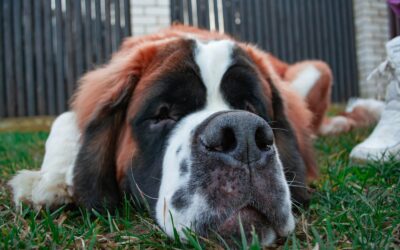How many teeth do dogs have? Well, there’s no one answer for this.
When it comes to your furry friend’s well-being, dental health is just as crucial as their wagging tails and playful barks.
Understanding the dental anatomy of dogs can help you take better care of your canine companion, ensuring they have a happy, healthy life.
In this blog post, we’ll explore everything you need to know about dog teeth, from the number they have to maintaining their pearly whites.
Introduction to Dogs and Their Teeth
Dogs, much like humans, rely on their teeth for various functions, including chewing, tearing food, and even communicating through body language.
However, unlike humans, dogs have a unique dental structure and specific needs that pet owners must cater to.
Whether you’re a seasoned pet owner or a newbie in the world of dog care, understanding your dog’s dental health is a step towards ensuring their overall well-being.
This guide will cover everything from the number of teeth dogs have at different life stages to proper dental care practices.
We’ll also look into common dental issues that dogs face and how you can prevent them. By the end of this post, you’ll be equipped with valuable insights to keep your dog’s mouth healthy and happy.

How Many Teeth Do Dogs Have?
This is a very broad question because there are many factors that can affect how many teeth dogs have.
Puppy Teeth and Development
Puppies, much like human babies, are born without teeth. However, around two to three weeks of age, puppies begin to develop their first set of teeth, known as deciduous teeth or “milk teeth.”
These temporary teeth are extremely sharp, designed to help them tear into their food as they transition from milk to solid foods.
By the time a puppy reaches about eight weeks old, they should have a full set of 28 deciduous teeth. These teeth include incisors, canine teeth, and premolars.
The sharpness of these teeth helps puppies explore their environment and learn through play—a crucial part of their development.
Transition to Adult Teeth
Puppies don’t keep their milk teeth for long. By the time they reach three to four months of age, these temporary teeth begin to fall out, making way for their permanent set of teeth.
This process, known as teething, is when puppies may chew more aggressively to alleviate discomfort.
Adult dogs typically have 42 teeth, which consist of 12 incisors, 4 canines, 16 premolars, and 10 molars.
These teeth are spread across the upper and lower jaws, with the canine teeth being particularly prominent due to their role in tearing food.
Why Tooth Count Matters
Understanding the number of teeth dogs have is essential for monitoring their dental health. Just like humans, dogs can experience tooth loss or damage, which can lead to other health issues.
Regular checks during your pet’s annual exam can help ensure all teeth are present and in good condition.

The Different Types of Dog Teeth
Just like us, dogs have different types of teeth as explained below:
Incisors and Their Function
The incisors are the small teeth located at the front of a dog’s mouth. In adult dogs, there are six incisors on the upper jaw and six on the lower jaw.
These teeth are primarily used for nibbling and grooming, helping dogs clean their fur and remove debris.
Canine Teeth and Their Role
Canine teeth are the long, pointed teeth found on either side of the incisors. Canine teeth tear into meat and treats.
They are also important for self-defense and play. The health of these teeth is crucial, as they play a vital role in a dog’s ability to eat and interact with the world around them.
Premolars and Molars
Moving further back in the mouth, dogs have premolars and molars. Premolars are used for shearing and cutting food, while molars are flat and are essential for grinding food down.
These teeth are critical for dogs that consume kibble or other hard foods, as they help break down the food into smaller, digestible pieces.

Common Dental Issues in Dogs
Dental issues for your dog can be dangerous if not caught early. Here are some of the most common dental issues in dogs:
Understanding Tooth Decay
Tooth decay in dogs, much like in humans, occurs when plaque and tartar build-up on the teeth.
This can lead to cavities, gum disease, and even tooth loss if left untreated. Dogs with decaying teeth may show signs of discomfort, such as avoiding hard foods or pawing at their mouths.
Periodontal Disease
Periodontal disease is one of the most common dental issues in dogs. It begins with gingivitis, where the gums become inflamed due to plaque buildup. If not addressed, it can progress to advanced dental disease, affecting the bones and structures that support the teeth.
Retained Deciduous Teeth
Some dogs, particularly small breeds, may experience retained deciduous teeth, where the baby teeth don’t fall out as they should. This can cause crowding and misalignment of the adult teeth, leading to potential dental problems. Veterinary professionals may need to remove these retained teeth to prevent complications.

Maintaining Your Dog’s Dental Health
One of the most effective ways to maintain your dog’s dental health is through regular brushing. Using a toothbrush and toothpaste specifically designed for dogs, you can help remove plaque and prevent tartar buildup. Human toothpaste should never be used, as it contains ingredients that can be harmful to dogs.
Dental Chews and Toys
Dental chews and toys can also play a significant role in promoting oral health. These products are designed to encourage chewing, which helps clean the teeth and massage the gums. Look for products that are safe and appropriate for your dog’s size and chewing habits.
Professional Dental Cleanings
In addition to at-home care, professional veterinary dental cleanings are essential for maintaining your dog’s oral health.
These cleanings allow veterinarians to remove tartar and check for any signs of dental disease. Scheduling these cleanings during your pet’s annual exam can help catch potential issues early.

Nutritional Needs for Dental Health
A balanced diet is crucial for maintaining your dog’s overall health, including their dental health.
Feeding your dog high-quality food that meets their nutritional needs can help ensure strong teeth and gums. Consult with your veterinarian to choose the best diet for your dog.
Foods to Avoid
Certain foods can be harmful to your dog’s teeth. For instance, avoid giving them pork or beef bones, as these can splinter and cause tooth damage.
It’s also best to avoid sugary treats that can contribute to plaque buildup and dog teeth decay.
The Role of Water
Water is vital for oral health, as it helps flush out food particles and bacteria from your dog’s mouth. Ensure your dog has access to fresh, clean water at all times to promote hydration and help maintain healthy teeth and gums.
Recognizing Dental Problems Early
Being aware of the signs of dental problems can help you address issues before they become severe. Look for symptoms such as bad breath, drooling, difficulty eating, loose or wiggly teeth, and swollen or bleeding gums.
If you notice any of these signs, consult your veterinarian for advice.
Monitoring Your Dog’s Behavior
Changes in your dog’s behavior can also indicate dental issues. If your dog becomes less interested in their food or toys or starts pawing at their mouth, it may be a sign of discomfort.
Regularly observing your dog’s behavior can help you catch any potential problems early.
Regular Check-Ups
Regular veterinary check-ups are essential for monitoring your dog’s dental health. Your veterinarian can assess your dog’s teeth and gums, perform cleanings, and provide guidance on maintaining their oral health.
These check-ups are especially important for older dogs, as they are more prone to dental issues.

Top Products for Dog Dental Health
To support your dog’s dental hygiene, consider incorporating some of the following highly-rated products into their routine:
- Vet’s Best Enzymatic Dog Toothpaste: This toothpaste is formulated with natural ingredients like aloe, neem oil, and baking soda to help reduce plaque and tartar buildup while freshening breath. Shop Now
- Nylabone DuraChew Edible Dental Chew: Designed for aggressive chewers, this dental chew promotes healthy teeth and gums while satisfying your dog’s instinct to chew. Shop Now
- PetSafe Busy Buddy Bristle Bone: This unique toy features a combination of bristles and edible treats, making it both a fun chew toy and a dental care product all in one. Shop Now
- Greenies Original Dental Treats: These veterinarian-recommended dental chews are designed to help clean teeth and promote fresh breath, making them a favorite among dogs and owners alike. Shop Now
- Arm & Hammer Dog Toothbrush Kit: This complete toothbrush kit offers everything you need to establish a good brushing routine, including a finger brush for easier access to your dog’s teeth. Shop Now
Using these products can help maintain your dog’s dental health and ensure they stay happy and active.

Stop by Snouts and Stouts Indoor Dog Park and Bar today for a dog park day in the AC!
Conclusion
A healthy mouth is essential for a happy dog. By understanding the dental anatomy of your canine friend and the importance of proper dental care, you can ensure they enjoy a lifetime of good health.
From counting those 42 adult teeth to providing regular care, every step you take contributes to your dog’s well-being.
Remember, a little effort in maintaining your dog’s dental health goes a long way in preventing potential issues and ensuring your furry companion stays by your side, smiling and wagging their tail. For further guidance, consult with your veterinarian or explore resources tailored to your dog’s specific needs.




